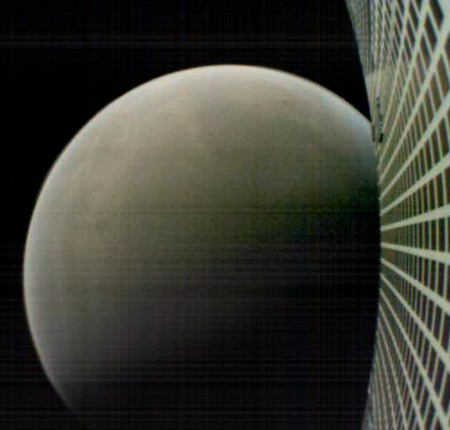Virgin Galactic finally reaches space, by one definition
Capitalism in space: By one of the definitions of where space begins, Virgin Galactic’s second SpaceShipTwo Unity finally reached space for the first time during a test flight today.
During a flight test today, Virgin Galactic’s SpaceShipTwo burned its engine for 60 seconds and reached an altitude of 271,268 (51.37 miles/82.7 km), which put the vehicle into space for the first time according to one definition of the boundary.
Pilots C.J. Sturkow and Mark Stucky deployed the spacecraft’s feather system — twin tail booms that re-configure the ship for re-entry — after reaching a top speed of Mach 2.9. They glided the vehicle back to a safe landing on Runway 12-30 at the Mojave Air and Space Port in California’s High Desert.
The U.S military initially defined space as beginning at 50 miles altitude. Later the international definition defining space as beginning at 100 kilometers (about 62 miles) became more accepted. In recent years there has been a push to accept the U.S. military’s older definition (partly I think generated by Virgin Galactic itself). Truth is, the U.S. military’s definition actually makes more sense, since it is possible to orbit a satellite at 50 miles, for short periods.
The pressure to change however does suggest that Unity might not be capable of reaching 62 miles.
Regardless, this flight culminates fourteen years of effort at Richard Branson s company to produce a reusable suborbital spaceship that can fly in space. It appears they have finally done it. Whether it will be reliable enough to fly repeatedly, with commercial passengers, remains to be seen. Moreover, the commercial landscape has changed considerably during those fourteen years. Had they flown a decade ago, as Branson repeatedly predicted, they would have been the only game in town. That is no longer the case. They now have a competitor, Blue Origin with its suborbital New Shepard spaceship, and affordable commercial orbital flights are just around the corner.
Still, Virgin Galactic’s achievement here is significant. They have built a spaceship that has taken humans to space (and can do it again), and they have done it with private funds.
Capitalism in space: By one of the definitions of where space begins, Virgin Galactic’s second SpaceShipTwo Unity finally reached space for the first time during a test flight today.
During a flight test today, Virgin Galactic’s SpaceShipTwo burned its engine for 60 seconds and reached an altitude of 271,268 (51.37 miles/82.7 km), which put the vehicle into space for the first time according to one definition of the boundary.
Pilots C.J. Sturkow and Mark Stucky deployed the spacecraft’s feather system — twin tail booms that re-configure the ship for re-entry — after reaching a top speed of Mach 2.9. They glided the vehicle back to a safe landing on Runway 12-30 at the Mojave Air and Space Port in California’s High Desert.
The U.S military initially defined space as beginning at 50 miles altitude. Later the international definition defining space as beginning at 100 kilometers (about 62 miles) became more accepted. In recent years there has been a push to accept the U.S. military’s older definition (partly I think generated by Virgin Galactic itself). Truth is, the U.S. military’s definition actually makes more sense, since it is possible to orbit a satellite at 50 miles, for short periods.
The pressure to change however does suggest that Unity might not be capable of reaching 62 miles.
Regardless, this flight culminates fourteen years of effort at Richard Branson s company to produce a reusable suborbital spaceship that can fly in space. It appears they have finally done it. Whether it will be reliable enough to fly repeatedly, with commercial passengers, remains to be seen. Moreover, the commercial landscape has changed considerably during those fourteen years. Had they flown a decade ago, as Branson repeatedly predicted, they would have been the only game in town. That is no longer the case. They now have a competitor, Blue Origin with its suborbital New Shepard spaceship, and affordable commercial orbital flights are just around the corner.
Still, Virgin Galactic’s achievement here is significant. They have built a spaceship that has taken humans to space (and can do it again), and they have done it with private funds.

